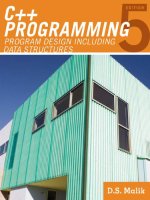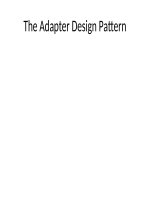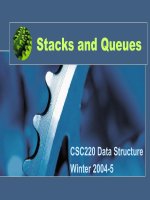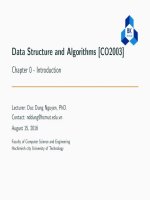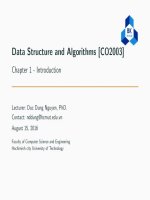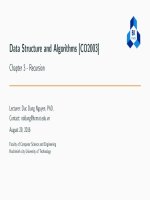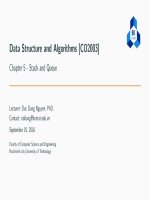C++ programming program design including data structure 7th ch13
Bạn đang xem bản rút gọn của tài liệu. Xem và tải ngay bản đầy đủ của tài liệu tại đây (698.82 KB, 41 trang )
Chapter 13:
Overloading and Templates
Objectives
• In this chapter, you will
– Learn about overloading
– Become familiar with the restrictions on operator
overloading
– Examine the pointer this
– Learn about friend functions
– Learn how to overload operators as members and
nonmembers of a class
C++ Programming: Program Design Including Data Structures, Seventh Edition
2
Objectives (cont’d.)
• In this chapter, you will (cont’d.)
– Discover how to overload various operators
– Become familiar with the requirements for classes with
pointer member variables
– Learn about templates
– Explore how to construct function templates and class
templates
C++ Programming: Program Design Including Data Structures, Seventh Edition
3
Introduction
• Templates: enable you to write generic code for
related functions and classes
• Function templates: used to simplify function
overloading
C++ Programming: Program Design Including Data Structures, Seventh Edition
4
Why Operator Overloading Is Needed
• Consider the following statements:
• Which of the following would you prefer?
C++ Programming: Program Design Including Data Structures, Seventh Edition
5
Why Operator Overloading Is Needed
(cont’d.)
• Assignment and member selection are the only builtin operations on classes
• Other operators cannot be applied directly to class objects
• Operator overloading: extends definition of an
operator to work with a user-defined data type
• C++ allows you to extend the definitions of most of the
operators to work with classes
C++ Programming: Program Design Including Data Structures, Seventh Edition
6
Operator Overloading
• Most existing C++ operators can be overloaded to
manipulate class objects
• Cannot create new operators
• Operator function: overloads an operator
– Use reserved word operator as the function name
C++ Programming: Program Design Including Data Structures, Seventh Edition
7
Syntax for Operator Functions
• Syntax of an operator function heading:
– It is a value-returning function
– operator is a reserved word
• To overload an operator for a class:
– Include operator function declaration in the class
definition
– Write the definition of the operator function
C++ Programming: Program Design Including Data Structures, Seventh Edition
8
Overloading an Operator: Some
Restrictions
•
•
•
•
•
•
Cannot change precedence or associativity
Default parameters cannot be used
Cannot change number of parameters
Cannot create new operators
Cannot overload: . .* :: ?: sizeof
How the operator works with built-in types remains
the same
– Can overload for user-defined objects or for a combination
of user-defined and built-in objects
C++ Programming: Program Design Including Data Structures, Seventh Edition
9
Pointer this
• Every object of a class maintains a (hidden) pointer
to itself called this
• When an object invokes a member function
– this is referenced by the member function
C++ Programming: Program Design Including Data Structures, Seventh Edition
10
Friend Functions of Classes
• Friend function (of a class): a nonmember function
of the class that has access to all the members of
the class
• Use the reserved word friend in the function
prototype in the class definition
C++ Programming: Program Design Including Data Structures, Seventh Edition
11
Definition of a friend Function
• "friend" doesn’t appear in function definition
• When writing the friend function definition
– The name of the class and the scope resolution operator
are not used
C++ Programming: Program Design Including Data Structures, Seventh Edition
12
Operator Functions as Member
Functions and Nonmember Functions
• To overload (), [], ->, or = for a class, the function
must be a member of the class
• If op is overloaded for opOverClass:
– If the leftmost operand of op is an object of a different
type, the overloading function must be a nonmember
(friend) of the class
– If the overloading function for op is a member of
opOverClass, then when applying op on objects of
type opOverClass, the leftmost operand must be of
type opOverClass
C++ Programming: Program Design Including Data Structures, Seventh Edition
13
Overloading Binary Operators
• If # represents a binary operator (e.g., + or ==) that
is to be overloaded for rectangleType
– It can be overloaded as either a member function of the
class or as a friend function
C++ Programming: Program Design Including Data Structures, Seventh Edition
14
Overloading the Binary Operators as
Member Functions
• Function prototype (included in the class definition):
• Function definition:
C++ Programming: Program Design Including Data Structures, Seventh Edition
15
Overloading the Arithmetic or Relational
Operators as Nonmember Functions
• Function prototype (included in class definition):
• Function definition:
C++ Programming: Program Design Including Data Structures, Seventh Edition
16
Overloading the Stream Insertion (<<)
and Extraction (>>) Operators
• Consider the expression:
cout << myRectangle;
– Leftmost operand is an ostream object, not a
rectangleType object
• Thus, the operator function that overloads << for
rectangleType must be a nonmember function
of the class
– Same applies to the function that overloads >>
C++ Programming: Program Design Including Data Structures, Seventh Edition
17
Overloading the
Stream Insertion Operator (<<)
• Function prototype:
• Function definition:
C++ Programming: Program Design Including Data Structures, Seventh Edition
18
Overloading the Stream Extraction
Operator (>>)
• Function prototype:
• Function definition:
C++ Programming: Program Design Including Data Structures, Seventh Edition
19
Overloading the Assignment Operator
(=)
• Function prototype:
• Function definition:
C++ Programming: Program Design Including Data Structures, Seventh Edition
20
Overloading Unary Operators
• To overload a unary operator for a class:
– If the operator function is a member of the class, it has no
parameters
– If the operator function is a nonmember (i.e., a friend
function), it has one parameter
C++ Programming: Program Design Including Data Structures, Seventh Edition
21
Overloading the Increment (++) and
Decrement (--) Operators
• General syntax to overload the pre-increment
operator ++ as a member function
– Function prototype:
– Function definition:
C++ Programming: Program Design Including Data Structures, Seventh Edition
22
Overloading the Increment (++) and
Decrement (--) Operators (cont’d.)
• General syntax to overload the pre-increment
operator ++ as a nonmember function:
– Function prototype:
– Function definition:
C++ Programming: Program Design Including Data Structures, Seventh Edition
23
Overloading the Increment (++) and
Decrement (--) Operators (cont’d.)
• General syntax to overload the post-increment
operator ++ as a member function:
– Function prototype:
– Function definition:
C++ Programming: Program Design Including Data Structures, Seventh Edition
24
Overloading the Increment (++) and
Decrement (--) Operators (cont’d.)
• Syntax to overload the post-increment operator ++ as
a nonmember function:
– Function prototype:
– Function definition:
C++ Programming: Program Design Including Data Structures, Seventh Edition
25
